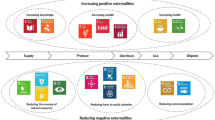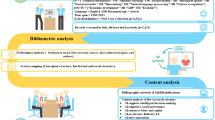Abstract
The transition towards knowledge society and economy is considered a new trend in the global economy. This transition has become a necessity especially for emerging economies, which are suffering from a large dependency on rentier sectors and low technological competitiveness. However, this process requires clear and effective policies to fit the needs of those countries and available resources. The aim of this study is to run a horse race in between knowledge society and knowledge economy with regard to their development impacts in Russia. We find that knowledge society has a significant impact on development indicators while knowledge economy has negative effect on development indicators. We recommend that developing countries should prioritize knowledge societies on knowledge economies to realize the development benefits.

Similar content being viewed by others
Notes
Индикаторы информационного общества: 2014, Национальный исследовательский универ- ситет «Высшая школа экономики», с 42.
References
Afgan, N. H., & Carvalho, M. G. (2010). The knowledge society: a sustainability paradigm. Cadmus, 1(1), 28–41.
Brinkley, I. (2006). Defining the knowledge economy. Knowledge economy programme report. The work foundation. London. http://www.theworkfoundation.com/Reports/65/Defining-the-knowledge-economy-knowledge-economy-programme-report. Access in 3 Aug 2016.
А.Р. Сафиуллин (2012). Потенциал развития экономики знаний в России. Серия «Экономика и Право». № 5-6. http://www.nauteh-journal.ru/index.php/---ep12-56/521-a. Access in 8 Dec 2016
Carayannis, E., & Dubina, I. (2014). Thinking beyond the box: game-theoretic and living lab approaches to innovation policy and practice improvement. Journal of the Knowledge Economy, 5(3). doi:10.1007/s13132-014-0207-6
Chen, D. H. C., & Dahlman, C. J. (2004). Knowledge and Development A Cross-Section Approach (Vol. 20433). Washington, DC: The World Bank.
David, P. A., & Foray, D. (2003). Economic fundamentals of the knowledge society. Policy Futures in Education Journal. p3. http://citeseerx.ist.psu.edu/viewdoc/summary?doi=10.1.1.123.555. Access in 13 Apr 2016.
Federal state statistics service, (Rosstat) (2014). Moscow. p38.
GeSCI (2011), ICT, Education, Development, and the Knowledge Society. Thematic Paper prepared for: African Leadership in ICT Program, December 2011. http://gesci.org/fileadmin/user_upload/4_ICT_in_STEM_Education_Files/ICT_Education_Development_and_the_Knowledge_Society_1_1_.pdf
Human Development Report (2014a). UN. p159.
Ilchenko, K., & Pyshnograiev, I. (2015). A composite indicator of K-society measurement. Ukraine. Proceedings of the 11th International Conference on ICT in Education, Research and Industrial Applications: Integration, Harmonization and Knowledge Transfer (ICTERI), May 14-16, 2015. http://ceur-ws.org/Vol-1356/paper_46.pdf. Access in 20 Feb 2016
Knowledge Economy Index (KEI) (2012a). Rankings. www.worldbank.org/kam. Access in 2 Nov 2015
Kuhn, T. (1962). The structure of scientific revolutions. Chicago: University of Chicago Press.
Leadbeater, C. (1999). New measures for the New Economy report. Technical Meeting by the Centre for Business Performance of the Institute of Chartered Accountants in England and Wales. London.
Levy, C., Soissons, A., & Holloway, C. (2011). A plan for growth in the knowledge economy, A Knowledge Economy programme paper. London. http://www.theworkfoundation.com/assets/docs/publications/290_plan%20for%20growth%20in%20the%20knowledge%20economy.pdf. Access in 14 June 2016
F. Machlup (1962). The production and distribution of knowledge in the United States. Princeton Press’s Notable Centenary Titles.
Meusburger, P. (2013). Relations between knowledge and economic development: Some methodological considerations. In P. Meusburger et al. (Eds.), Knowledge and the economy. (Knowledge and space, Vol. 5, p. 15–42). doi:10.1007/978-94-007-6131-5_2.
Mokyr, J. (2002). Knowledge Society: Theoretical and historical underpinnings. United Nations, New York.
Paličková, I. (2014). Influence of the knowledge economy on the economic growth and economic level of countries. Technical University of Ostrava http://www.slu.cz/opf/cz/informace/acta-academica-karviniensia/casopisy-aak/aak rocnik-2014/docs-3-2014/Palickova.pdf. Access on 20 Aug 2016.
Smith, K. (2002). What is the knowledge economy? Knowledge intensity and distributed knowledge bases. United Nations University. Maastricht Discussion papers. ISSN 1564-8370
The Global Innovation Index (2014b).
UNESCO (2005). Towards Knowledge Societies. UNESCO Publishing 2005 by the United Nations Educational ISBN 92-3-204000-X.
United Nations (2005a). Towards an integrated knowledge society in Arab countries: strategies and implementation modalities. New York. p3.
Żelazny, R. (2015). Information society and knowledge economy – essence and key relationships. Journal of Economics and Management, 20(2). ISSN 1732-1948.
Индикаторы информационного общества (2014). Национальный исследовательский универ- ситет «Высшая школа экономики». с 42. https://www.hse.ru/data/2015/02/25/1090557184/IKT_2014_for_site.pdf. Access in 7 Dec 2016
Author information
Authors and Affiliations
Corresponding author
Appendix
Appendix
Rights and permissions
About this article
Cite this article
Alnafrah, I., Mouselli, S. The Knowledge Society Vis-à-vis the Knowledge Economy and Their Potential Development Impacts in Russia. J Knowl Econ 10, 205–220 (2019). https://doi.org/10.1007/s13132-017-0448-2
Received:
Accepted:
Published:
Issue Date:
DOI: https://doi.org/10.1007/s13132-017-0448-2




